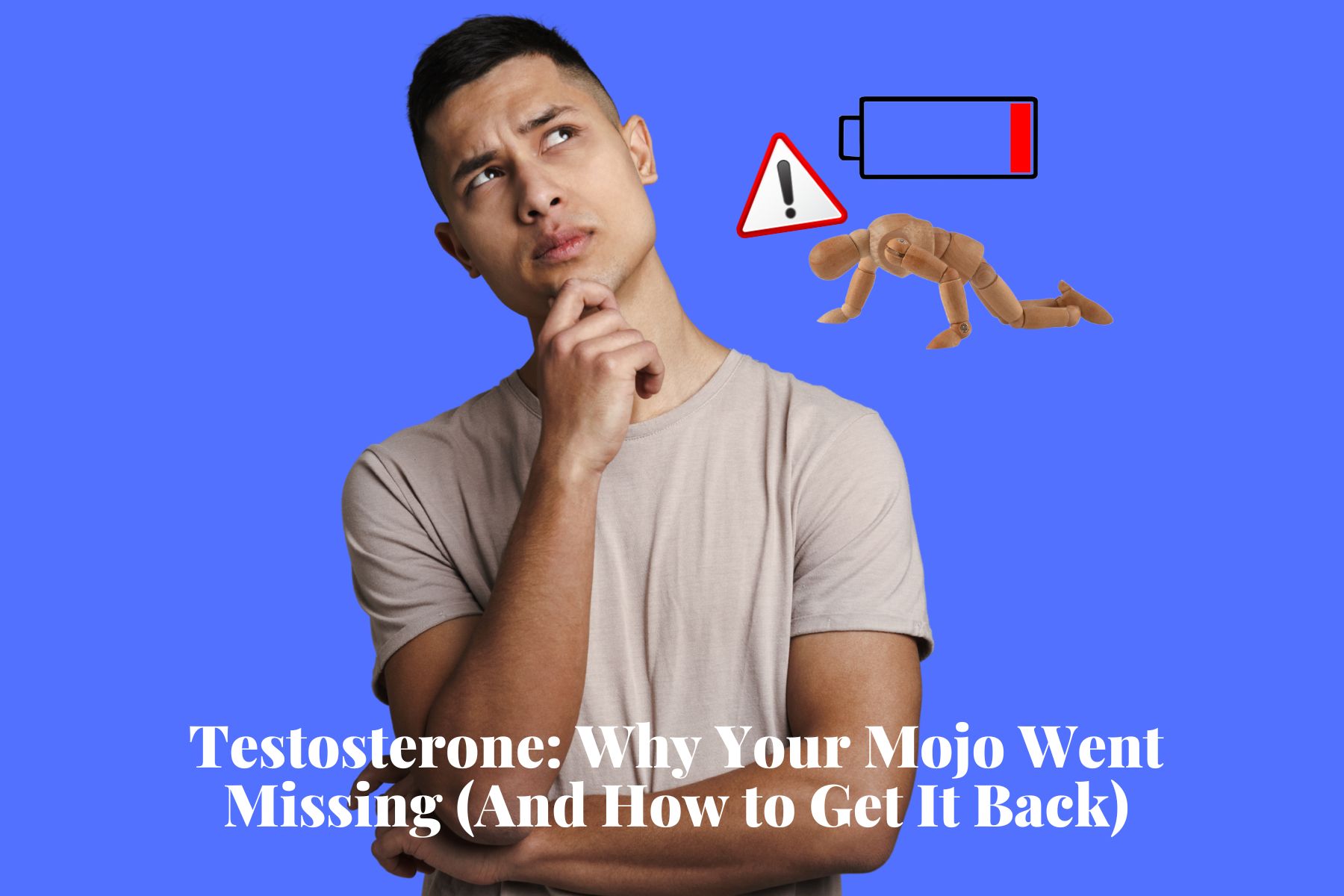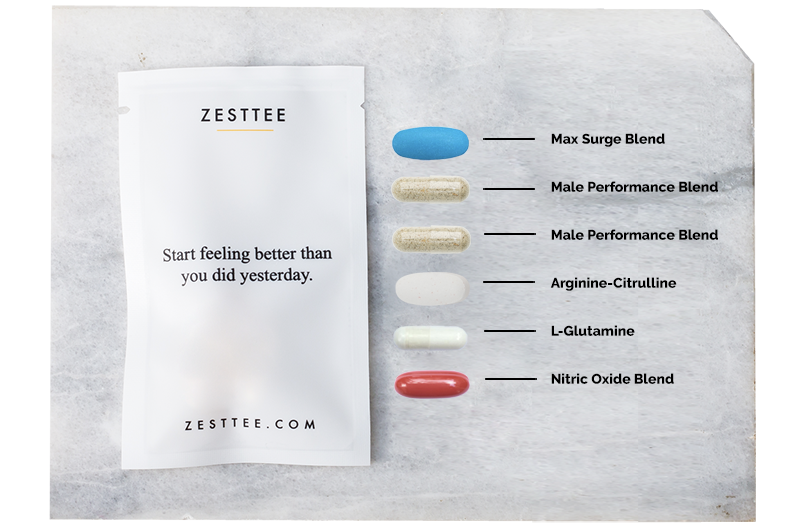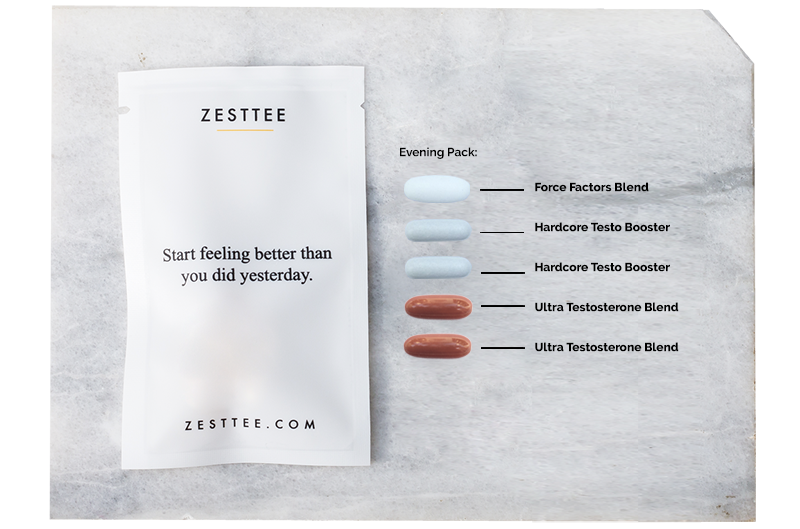CATEGORY: BOOST TESTOSTERONE
Testosterone: Why Your Mojo Went Missing (And How to Get It Back)

The Mysterious Case of the Missing Mojo
Remember your 20s—hitting the gym after an all‑nighter and still making it to work? Fast forward a decade, and suddenly, Netflix over nightlife isn’t a choice, it’s the default. The gym feels punitive. And bedroom performance? Let’s say it’s “posting a cameo” instead of “leading role.”
This shift might not just be midlife—it could be a case of declining testosterone.
What Testosterone Really Does
Sure, testosterone is synonymous with muscles and libido—but that’s only the tip of the iceberg. This hormone also influences:
-
Energy & stamina—when T dips, comfort becomes king.
-
Mood & focus—sharpness goes dull, and irritability becomes routine.
-
Body composition—hello, dad bod and lingering belly fat.
-
Cognitive clarity & sleep quality—low levels can fog your mind and disrupt rest.
The result? Everything feels like it's working against you, not for you.
Everyday Signs You Might Have Low T
-
Three coffees just to wake up.
-
Muscles that seem to be reflecting your bedtime: early.
-
A stubborn midsection that didn’t RSVP but moved in anyway.
-
Sex drive? More like a faint suggestion than an invitation.
-
Loved ones wonder if you've upgraded your personality to "Grumpy Old Man."
Unmasking the Causes: It's Not Just About Hormones
1. Low Testosterone / Hypogonadism
This condition—primary (testicular origin) or secondary (brain origin)—is a common root of low libido, fatigue, and mood changes. Diagnosis hinges on accurate morning testosterone testing for precision.
2. Lifestyle & Psychological Factors
Testosterone isn't the sole suspect. Chronic stress, sleep disorders, depression, relationship strain, and medication use can mimic—or mask—low-T symptoms.
3. Medications & Substance Use
Common medications—SSRIs, beta blockers, opioids, even some antifungals—can blunt libido and knock testosterone levels. Excessive alcohol or recreational drug use can further depress hormone balance.
What Can You Do—Beyond Supplements?
A. Smart Lifestyle Overhaul
-
Exercise sensibly: Both undertraining and overtraining can sap libido. Balance is key.
-
Nutrition matters: A Mediterranean-style diet rich in vitamin D and zinc supports hormonal health. Avoid excessively low-fat regimens—they've been linked to reduced testosterone levels.
-
Prioritize sleep: Sleep disorders can dampen hormone levels and drive.
-
Stress management: Chronic stress raises cortisol, which suppresses gonadal hormones.
-
Reduce substances: Alcohol, tobacco, and illicit drugs can impair sexual health and testosterone production.
B. Communicate for Connection
Low libido may be the brain's protective mechanism. Communication—about desires, boundaries, and needs—can improve intimacy and confidence.
C. Medical Assessment
-
Get evaluated: A comprehensive check—including hormone panels, prolactin, LH, and testosterone—is crucial, especially in clinically significant cases.
-
Consider natural alternatives: Supplements, lifestyle strategies, and targeted therapies can support healthy testosterone levels without direct hormone replacement.
D. Alternatives and Supportive Options
-
hCG (Human Chorionic Gonadotropin): Stimulates natural testosterone production—valuable for men who wish to retain fertility.
-
Clomiphene citrate: Boosts endogenous hormone production, with fewer fertility concerns.
-
Lifestyle and mental health: Often, the most sustainable improvements come from exercise, nutrition, sleep, stress reduction, and open communication.
Real‑World Transformations: Beyond the Capsule
Low libido and ED can signal deeper vascular or systemic issues. Comprehensive approaches—covering lifestyle, mental health, and testing—have restored energy, mood, and even cognitive function to men previously dismissed as simply “getting older.”
Environmental shifts and lifestyle changes are pushing “manopause” into younger decades. Awareness and early, supervised intervention are becoming game‑changers.
Wrap‑Up: Your Mojo, Reclaimed
-
Listen to your body—signs of low energy, mood shifts, and libido changes deserve attention.
-
Prioritize lifestyle fundamentals—sleep, nutrition, stress, and moderation go a long way.
-
Seek medical guidance—don’t self‑diagnose. Accurate testing and expert oversight matter.
-
Explore supportive options—hCG, clomiphene, lifestyle, and mental health strategies can all help restore vitality.
-
Communicate honestly—your relationships, purpose, and self‑confidence deserve space to flourish.
Can You Boost It Naturally?
Yes—lift heavy, sleep like a king, eat zinc-rich foods. But let’s be real: most of us aren’t cooking oysters and pumpkin seeds after work. And getting 8 hours of sleep? Ha.
That’s where modern help comes in.
The Zesttee Ultra Testosterone Program: Your Wingman in a Capsule
Think of this as the backup squad for your manhood. Packed with over 35 scientifically backed ingredients (like Tongkat Ali, Fenugreek, and Zinc), it’s designed to:
-
Fire up your energy 🔋
-
Bring back your strength 💪
-
Revive your drive (yes, that drive) 🔥
-
Keep your mood in check 😎
It’s basically the upgrade button your body forgot to press.
Bottom Line
You don’t have to accept “low energy and low drive” as normal aging. With the right support, you can reboot your mojo, get your edge back, and feel like the man you actually want to be.
👉 Ready to stop feeling like half-charged WiFi? Check out the Zesttee Ultra Testosterone Program today.



